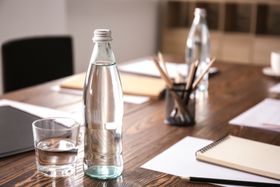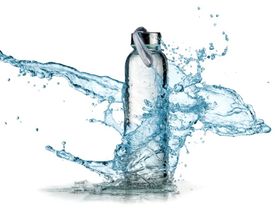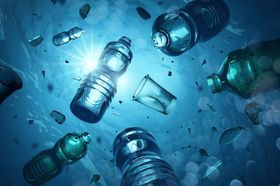Glass vs. Plastic Water Bottle: Which Is Best for Drinking?
A head-to-head comparison of glass and plastic water bottles, weighing the environmental impact, health concerns, and practical advantages of each to help you make an informed choice.
Updated February 4, 2025

Billions of single-use plastic bottles are manufactured every year, and only a small number of them are actually recycled. The contents of plastic bottles are typically filtered water, mineral water, or spring water. However, chemicals from the plastic leach into the water.
But by opting for a glass over a plastic bottle, you avoid this negative effect in addition to reducing pollution in the ocean and gaining financial benefit from carrying a reusable bottle.
Glass vs. Plastic Water Bottles: Health Considerations
Plastic Bottles
Most plastic water bottles are made of Polyethylene Terephthalate, which is lightweight, strong, and resistant to impact. PET is also transparent, making it visually appealing for bottled beverages.
Some plastic bottles also contain additives that enhance the thermal stability of PET and prevent degradation from heat and UV exposure. Manufacturers may also add dyes or pigments for colors.
Recent studies have highlighted concerns about microplastics generated from plastic water bottles. [1] The mechanical interaction between bottle caps and the bottle neck during opening and closing can lead to microplastic contamination in the water contained within.
Glass Bottles
Glass water bottles are primarily made from soda-lime glass, a common type that's favored for its durability, safety, and recyclability. The material is composed mainly of silica (about 70-75%), sodium carbonate (soda, about 12-15%), and calcium oxide (lime, about 10-15%).
This type of glass is known for its clarity, strength, and resistance to thermal shock. It is also non-reactive, making it a safe option for storing beverages without leaching harmful chemicals.
Manufacturers may also add various metal oxides can be added to produce colored glass. For instance, cobalt oxide can create blue glass, while iron oxide can result in green or brown hues.
Being made from natural materials (sand, soda ash, and limestone), glass doesn't pose the same health risks associated with certain plastics, such as BPA or phthalates.
Winner: Glass bottles
Environmental Impact
Plastic Water Bottles
Plastic water bottles contribute significantly to plastic waste. The disposal of these bottles poses environmental challenges due to their non-biodegradable nature.
But, innovative researchers are looking into using discarded PET bottles as insulation in building materials, potentially reducing landfill waste while providing thermal resistance. [2]
Glass Water Bottles
Glass is more environmentally friendly compared to plastic due to several factor. Unlike plastic, it doesn't leach chemicals into the contents it holds, ensuring that water remains pure and safe for consumption.
Studies show that while glass bottles have a higher initial environmental impact due to energy-intensive production processes, their long-term use and recyclability can make them more sustainable than single-use plastics when reused multiple times. [3]
Winner: Glass bottles
Cost Analysis
Plastic Water Bottles
The primary material for plastic water bottles, PET is relatively inexpensive compared to other materials. The cost can vary based on market fluctuations, but it generally remains affordable due to its widespread availability and production capabilities.
Glass Water Bottles
The average cost of a 12-ounce glass bottle is approximately $0.31, while a PET bottle costs around $0.364. This results in a cost advantage of about $0.054 per filled glass bottle compared to PET. Plus, they are reusable, which means you can save money in the long run.
The global market for glass bottles is projected to grow from $40.2 billion in 2023 to $70.2 billion by 2033, reflecting a compound annual growth rate (CAGR) of 5.7%. [4] This growth is driven by increasing consumer preference for sustainable packaging solutions.
Winner: Glass water bottles
So, Which Bottle Type Should You Choose?
Glass is a more sustainable choice than plastic for beverage containers. It can be endlessly reused and recycled, making it an environmentally friendly option. Borosilicate glass, in particular, offers several advantages. When properly cared for, a glass bottle can last for many years, providing a sustainable solution for your drinking water needs.
The risks associated with plastic water bottles are becoming increasingly apparent. In an effort to reduce single-use plastic waste, some people have turned to reusing these bottles. However, this practice comes with its own set of drawbacks.
A better approach is to avoid plastic bottles altogether and invest in a high-quality glass bottle. By making this switch, you not only sidestep the disadvantages of reusing plastic but also contribute to the reduction of single-use plastic waste.
Glass bottles offer lifelong durability. They are easy to clean, resistant to chemical leaching, less hospitable to bacteria, and more environmentally friendly. Mayu Water's glass bottles provide a great alternative to plastic. They help reduce plastic waste while offering chemical-free, great-tasting water.
References:
- T. Singh, “Generation of microplastics from the opening and closing of disposable plastic water bottles,” Journal of Water and Health, vol. 19, no. 3, pp. 488–498, Apr. 2021, doi: 10.2166/wh.2021.025. Available: https://pubmed.ncbi.nlm.nih.gov/34152301/
- C.-L. Henning and M. Meyer, “Is borosilicate glass actually recyclable?,” Mayu Water, Oct. 06, 2024. Available: https://mayuwater.com/a/resources/water-bottles/is-borosilicate-glass-actually-recyclable?srsltid=AfmBOorwh3l_qgqZ5yQbQ2uuFx3NZMenjCSCHyJ97inRnjy_7NtA4uiC
- C. Ferrara, G. De Feo, and V. Picone, “LCA of glass versus PET mineral water bottles: an Italian case study,” Recycling, vol. 6, no. 3, p. 50, Jul. 2021, doi: 10.3390/recycling6030050. Available: https://www.semanticscholar.org/reader/745e8786f8d7d0f134e89b57a44070905a2be150
- “Glass bottles Market,” Size, Demand, Growth & Opportunity, Feb. 02, 2023. Available: https://www.futuremarketinsights.com/reports/glass-bottles-market
Disclaimer: The information published by MAYU Water is not a substitute for the expert knowledge, advice, and recommendations of trained professionals. We strongly recommend consulting with industry experts and primary or scientific sources before making any health, research-related, or other important decisions.














































